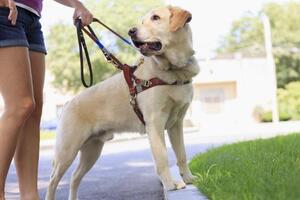|

Service dogs are trained assistants, not just pets. They're working animals with special training. The types most people think of first are guide dogs that help blind people get around. However, there are many types of service dogs. They help people with various disabilities and health issues. This helps their owners do daily tasks that they couldn't do on their own.
1. BlindnessGuide dogs help people who are blind or have other vision problems. These dogs wear special harnesses. These devices help their owners tell the dog where they want to go. A guide dog keeps its owner out of harm's way. The dog knows how to spot and even clear possible obstacles. It can help its owner safely cross busy streets and use public transportation. Guide dogs also help their owners safely move around indoors and perform certain tasks.
2. HearingHearing or signal dogs help people who are deaf or have trouble hearing. They are able to alert people to noises and events happening around them. Hearing dogs are trained to recognize various sounds, usually within seconds. For instance, they can identify a nearby siren, a ringing phone, or a knock at the door. The dogs make different types of contact with their owners for the different sounds. That way the owners know what the dogs are trying to tell them.
3. EpilepsySome service dogs help people who have seizures. They may stand guard and seek out help if their owner is having a seizure. Seizure response dogs can also provide physical support for those who lack balance. There is some evidence that some dogs can predict seizures and warn their owner before one happens. This gives the owner time to sit down or move to a safe place before the seizure starts. However, service dogs may not be able to predict seizures every time.
4. DiabetesGlycemia alert dogs are service dogs that help people with diabetes. They respond when someone experiences low or high blood sugar levels. It’s unclear exactly how these dogs are able to detect these spikes or dips. Scientists suggest these dogs may be able to smell changes in their owners’ sweat or breath. This can help their owners gain better control of their diabetes. It can prevent the need for emergency medical help and reduce medical costs. Having a service dog can also help people with diabetes stay independent and enjoy a better quality of life.
5. Physical DisabilitiesSome service dogs help people with physical disabilities perform routine tasks that they can’t do on their own. For instance, these dogs can open doors, press elevator buttons, and turn lights on or off. They can carry objects and pick up items from the floor. They can pull wheelchairs for those who can’t walk. They can provide support for people who have trouble with balance. Service dogs can also alert other people when their owners need human help.
6. PTSD (Post-Traumatic Stress Disorder)PTSD can develop after a terrifying or life-threatening event, such as rape or military combat. People with PTSD may panic or feel stressed or afraid, even when they're not in danger. Psychiatric service dogs can remind their owners to take medication. They can search rooms and turn lights on or off to help people feel safe.
Psychiatric service dogs can help people with other mental health disorders as well. Sometimes these dogs just provide consistent company and comfort. But they can also stop people from hurting themselves. There are also "therapy" dogs. They are soothing companions to people with anxiety or other mental health issues. But they aren't considered service dogs.
7. Autism and Asperger SyndromeDogs that have learned to help people with autism are known as SSigDOGs. That's short for sensory signal dogs or social signal dogs. Autism is a range of disorders that affect the brain and development. People with an autism spectrum disorder have some degree of social problems and trouble communicating. They may also engage in repetitive behaviors. Some rock and twirl. Others may do things that cause themselves harm, like banging their heads. The dogs are taught to distract their owners. This can interrupt these behaviors and help keep people with an autism spectrum disorder safe.
8. InfectionService dogs may have a role in finding dangerous germs. A dog's sense of smell is up to six million times stronger than a person's. Researchers have found that service dogs in hospitals can detect the bacteria C. difficile, which causes diarrhea. People with the infection often need a long hospital stay. Treating this infection costs about $800 million a year in the United States. Service dogs may help prevent these infections, shorten hospital stays, and reduce healthcare costs.